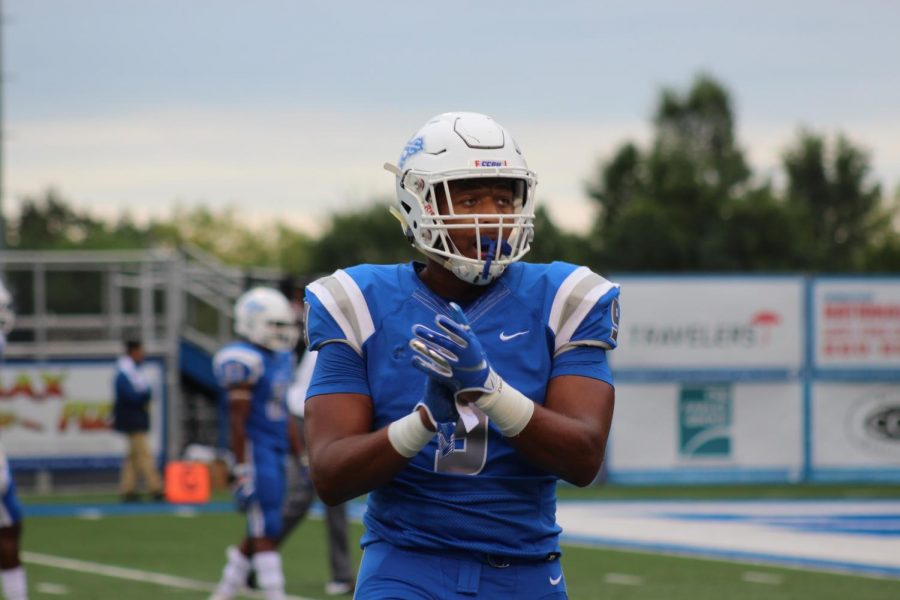CCSU Athletics Scheduling Remains Mostly Unchanged Despite Deficit
January 25, 2019
Despite being in a reported deficit, Central Connecticut’s Athletics Department has yet to take drastic measures to increase revenue through scheduling of football and men’s basketball contests.
In March of 2017, CCSU President, Dr. Zulma Toro, announced she was forming an Athletics Task Force to figure out a way to increase revenue. One of their main goals was to keep Central at the Division I level, showing how serious their deficit was. While CCSU did remain a DI school, it became evident that the Athletics Department needed help financially.
During the 2018 football season, Central faced DI opponent Ball State, earning $400,000 for the contest according to the CCSU Athletics Department. However, the very next week they then paid Division II Lincoln $25,000 for a home contest at Arute Field.
Going forward, Central’s newest Athletics Director Brian Barrio says that paying for games, such as what the school did against Lincoln, is something he would like to avoid.
“In the future, I’d like to avoid paying any guarantees because of our financial situation, I don’t think we need to,” Barrio said.
While Barrio wants to avoid spending money in football scheduling, he said he also does not plan on adding another massive revenue generating matchup like a Ball State to the team’s schedule going forward.
“I don’t want student-athletes to feel that their only purpose here is to generate revenue for us, their experience matters to me,” Barrio said. “Playing one big game a year, that’s kind of like our showcase, our chance to go out on a big stage and it happens to generate revenue for the university. If I asked them to play two of those, I feel like I’m saying to them, their season is less important to me than just generating revenue.”
Barrio went on to argue that a “perfect” football schedule for the Blue Devils would involve a non-Power Five Football Bowl Subdivision (FBS) team for a smaller guarantee plus a Football Championship Subdivision program that would pay the school a guarantee.
“You play a UConn or a UMass type team for one game, with them paying a smaller guarantee since you’re not flying, and then play an Albany or Stony Brook or Delaware who will pay us a decent guarantee, together that’s about as much as we would make playing Ball State,” Barrio said. “Now you have two games where you’re probably a little more competitive and the atmosphere is fun for fans.”
While Barrio has more of a role in football scheduling, when it comes to men’s basketball, head coach Donyell Marshall has a lead role in determining who his Blue Devils will play.
In 2018, CCSU scheduled two contests against DI Power Five opponents, Virginia Tech and Oregon State. Central was paid $80,000 and $90,000 for those contests, respectively, according to the Athletics Department. They also played Providence and Georgetown of the Big East Conference, also considered a high-major.
However, of the three non-conference home games the team scheduled, two were against lower level competition in DII Pine Manor and Division III Penn State Wilkes-Barre. Their one non-conference home game came against UMass Lowell, who has not had a winning season since the 2012-13 season.
While Marshall and his staff constructed these schedules before Barrio was the AD, Barrio feels that the extra game against a DIII opponent could have been erased. His goal going forward is to limit men’s basketball games against lower than DI opponents to one per year.
Of the team’s second matchup against DIII Penn State Wilkes-Barre, Barrio says, “That won’t happen again.”
Coach Marshall feels that with many schools unwilling to play Central at home, he must schedule games against lower-level competition to ensure his team a victory.
“Obviously, we have to play games like Virginia Tech and Georgetown and Providence in order for financial things. And you play teams that are (DIII) hoping you can get a win, hoping that you can come back and do what the Virginia Techs do to you,” Marshall told The Recorder following the Wilkes-Barre contest.
“People don’t understand and people don’t like them, but with our conference having to play the buy games, it’s nice to be able to see these kids get a win here and there. If you want home games, you’re going to have a couple DII and DIIIs, it’s just how it is.”
One men’s basketball scheduling decision that has caught public attention is that of Texas Southern. During the 2017-18 season, the Tigers scheduled 13 straight out-of-conference away games. Among the teams they faced were number three Kansas, 15 TCU, 18 Gonzaga and 21 Baylor, as well as other formidable opponents such as Syracuse, Ohio State and Oregon. Texas Southern lost every single game, yet they still won their conference and made the NCAA Tournament.
Outside of just making the tournament, the unique scheduling earned Texas Southern almost $800,000, according to David Squires of The Undefeated.
Texas Southern’s head coach Mike Davis views this kind of schedule as a benefit for his team and his players. In an interview with Squires, he remarked that playing on the road gives the Tigers an experience they would not otherwise receive.
“We use the money to support our program and help the guys have lifetime experiences. We stay in good hotels and eat in hotels, whereas some schools just grab pizzas,” Davis said, “We eat a big pregame meal, and then after the game we have a big meal waiting for us. And it gives our kids a chance to play in other arenas, something they will remember for the rest of their lives.”
While Texas Southern’s unorthodox scheduling has earned them almost twice of what CCSU made for playing Ball State, Barrio does not see himself and the school’s Athletic Department making that drastic of a change to their scheduling anytime soon.
“I want these kids to graduate, I want them to be in class occasionally and it’s tough flying them across the country constantly,” Barrio said. “If I put my kids on a plane 11 times during the non-conference schedule, their grades are going to suffer, their graduation rates will suffer. I tell their parents when they come on visits that the most important thing is developing as a person and student, as well as getting a degree. If I then say, I need you to play 10 games on the road all across the country to raise money for me, I think I’m kind of full of it.”
While he doesn’t expect major changes, Barrio still wants to be aggressive. He plans on scheduling around four or five major non-conference games a year and plans on using Thanksgiving and Winter Break, when students are not in classes to schedule those games and make a higher revenue.
Barrio and his staff have met with both the coaching staffs for football and men’s basketball and think they do a diligent job of choosing opponents. He thinks going forward they are more than capable of crafting challenging, yet beneficial schedules.
That being said, the CCSU Athletics Department remains mostly unchanged when it comes to scheduling opponents. While subtle changes such as scheduling a high-level FCS team in football or adding more Power Five non-conference games in men’s basketball are in play, neither sport should expect to see massive changes to their level of competition, even in the deficit.
However, even without a massive scheduling change, Barrio still has ideas on how to raise revenue and get CCSU and the Athletics Department closer to debt-free.
“I don’t think there’s one magic revenue stream out there, I think it’s a combination of things,” Barrio said. “We have to get better at fundraising, we have to get better at corporate sponsorships, we need to be more strategic about the guarantees, it’s some things that aren’t that sexy like summer camps. They’re all apart of the puzzle, and every one of them will have to get stronger.”




Donna Fappiano • Jan 30, 2019 at 12:13 am
Very well written article with Impressive articulation of facts. Great Job Author…